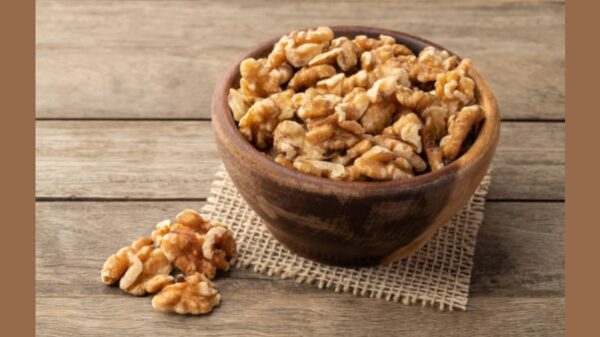
If you’ve heard “you are what you eat,” you already know.
But turns out, this is more than just a catchy slogan. What it really means is that everything you put in your body impacts it. If you eat ultra-processed, sugary and high-sodium foods, you’re going to feel it. And if you eat clean, organic, locally grown food, you’ll feel it too.
Turns out, what you eat makes a big difference. From the effectiveness of your thinking to inflammation in your body and even signs of depression, good food goes far.
Here are five science-backed ways your diet affects your brain.
1. Memory and Cognition
We often hear that fat is bad for us.
But what about the good fats? In case you don’t know, one of the best fats out there is omega-3 fatty acids. You can find these healthy fats in fish like salmon, walnuts, and flaxseeds predominantly. What they do is actually pretty remarkable.
As critical components of your neural membranes, omega-3 fats help ‘streamline’ your brain activity. As a result, you can think clearer, have a better memory, and even have a better attitude. In fact, omega-3s are an essential part of the actual structure of your brain cells!
So look into sardines and salmon, go for nuts, look into seeds, and don’t forget leafy greens like kale and spinach! Your brain will also experience less inflammation as a result, making learning and remembering all the more easy.
2. Neurotransmitter Efficiency
Basically, neurotransmitters are chemicals in our brains that transmit important signals. When you’re not eating well, these connections can get ‘gunked up,’ making it harder to think, remember, and learn.
Fortunately, amino acids – a fundamental building block – can help get these neurotransmitters firing smoothly. Without these amino acids and the protein-heavy foods that provide them, your brain won’t produce the transmitters it needs!
So look into foods that are good for your neurotransmission. These include everything from turkey to chicken, eggs, cheese, and nuts and seeds.
3. Anti-Inflammation
You’ve heard that inflammation is bad, but did you know chronic inflammation has been linked to virtually every disease under the Sun?
Whether it’s neurological disorders like dementia and Alzheimer’s or terminal diseases like cancer, too much of the wrong diet can supercharge inflammatory markers. In other words, refined sugars and bad fats.
From there, poor memory, brain fog, and low cognition can all result.
But here’s the good news. You can combat these effects by enjoying antioxidants, which come from fruits and veggies. These antioxidants reduce damage in your cells and tissues, keeping inflammation down.
Considering a more anti-inflammatory diet?
Look into blueberries and strawberries, first and foremost. Also incorporate green tea, olive oil, leafy greens, and turmeric, a popular spice.
You won’t regret it!
4. Neuroplasticity
If you haven’t heard of neuroplasticity, it’s amazing. Basically, this term refers to your brain’s ability to form new connections, learn new things, and repair itself after injuries. If you’re looking to spruce things up, foods rich in polyphenols and flavonoids are the way to go.
Your best bet for obtaining these are from teas, veggies, and fruits. Your brain can actually grow new neurons as a result!
Love chocolate? Well, you’re in luck, because dark chocolate is super rich in what your brain needs. Also, consider blueberries and green tea. Citrus fruits like oranges and lemons are also great, as is a little red wine when consumed responsibly.
You’ll be learning things at a faster rate before you know it!
5. Symptoms of Depression
You are what you eat – and your gut and brain know it best.
As a matter of fact, the “gut-brain axis” is a very critical part of your health. From all the good (and bad) bacteria in your digestive tract to the foods you feed them, it’s all very complex.
But here’s one thing you should know for certain: Your mood and mental health depend on a healthy gut. If your gut microbiome is lacking, anxiety and depression may follow.
Did you know that fermented foods can greatly affect how you feel and think? Take, for instance, probiotics, which are good bacteria for creating necessary brain chemicals. If you ingest a healthy amount of these, you can regulate your mood pretty easily.
Not sure where to begin?
Look into foods like yogurt, kefir, sauerkraut, tempeh, and kimchi. If you haven’t heard of some of these, you’re in for a pleasant surprise!
And that’s what it’s all about. Gradual changes come from day-to-day tweaks. Depending on what your diet is like now, you may enjoy pretty significant benefits or just subtle ones. But rest assured, if you put in the effort, you’ll get what you deserve: a healthier body and mind!
Medically Reviewed By:

Eric Meredith
Chef Eric Paul is a classically trained chef, Registered Dietitian, Certified Personal Trainer, and expert in chronic disease prevention with over 15 years of experience. His work has been featured on major networks like ABC, CBS, and ESPN. Through his nonprofit, Health Heroes, he uses entertainment and technology to make health information more engaging for youth. He is also a member of Kappa Alpha Psi Fraternity, Inc. and a board member of 100 Black Men of Chicago.









You must be logged in to post a comment Login